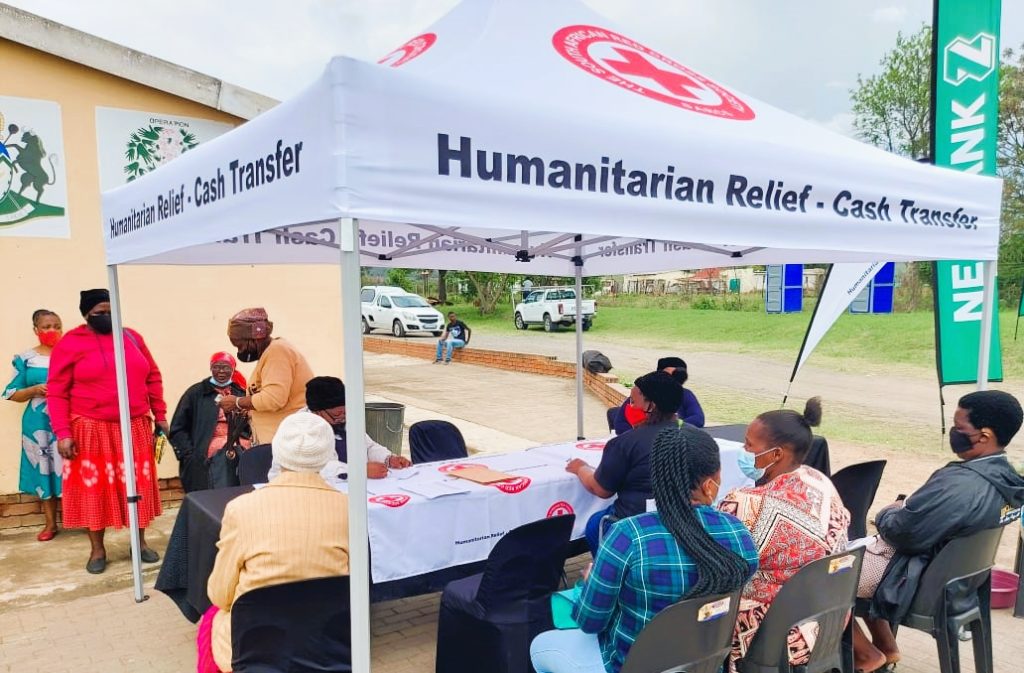April 4, 2022
Learning-by-doing: South Africa Red Cross Society’s engagement in Cash and Voucher Assistance (CVA)
Authors: Aston Mulwafu, Head of Disaster Management and Cash Surge, Malawi Red Cross Society; Ireen Mutombwa -Shumba, National Disaster Manager, South Africa Red Cross Society; and supported by Maja Tønning, Regional CVA Coordinator, IFRC Africa

In July 2021, several provinces in South Africa were impacted by urban violence following the arrest of former President Jacob Zuma. The situation triggered wider rioting and looting in the provinces of KwaZulu-Natal and Gauteng, further fueled by high unemployment rates, poverty, and economic inequality. The violence and rioting led to the death of 212 individuals and the arrest of 2,554 people.
In response to the crisis, the International Federation of the Red Cross and Red Crescent Societies (IFRC) approved the Disaster Relief Emergency Fund (DREF) to help South Africa Red Cross Society (SARCS) provide immediate relief and lifesaving assistance to the affected households. For the first time, SARCS opted to provide the support through cash transfers, which are seen to be more dignified and offer free choice for affected populations. A Cash Surge delegate from Malawi came to South Africa to support SARCS in the set-up of the response, including on contracting a financial service provider (Nedbank) and ensuring that the National Society had the capacity and the right tools in place to deliver cash in a timely and accountable manner. In total, SARCS reached 1,636 households with cash support amounting to 350,490.95 CHF.
Video of old woman giving thanks to SARCS for the cash assistance:
On the 12th of December 2021 to mid-January 2022, severe thunderstorms in South Africa hit the Eastern Province consecutively leaving 290,410 people in desperate situation, with 23 fatalities and several injuries recorded. The most severe impacts were related to people’s loss of shelter, increased food insecurity and disrupted livelihoods. For the second time in only 6 months, SARCS opted to respond with cash assistance supporting 1,000 household with total funding of 374,026.13 CHF. Once again, the cash surge capacity was offered to the National Society to support the cash response.
Learning from one response using cash as a modality to the next
Key experiences and lessons learned between the first and second project using cash transfers:
- Communication is key among members involved in cash assistance processes.
- Verification is paramount especially when using phone numbers of affected populations.
- Community members and local leaders must be involved at all stages of the response.
- Data management is critical and need to be prioritised.
- Using cash assistance restores dignity of targeted beneficiaries and majority of people were appreciative of the support.
- The scope and benefits of using cash assistance is clear and accepted throughout the National Society, especially after having a national cash and markets training.
Video of SARCS staff appreciating the opportunity to utilise CVA as a modality
The process for SARCS to build up basic capacities on cash transfers and be able to implement this was very much through learning-by-doing as the emergencies occurred at a time when the National Society had no prior experience in cash and voucher assistance. However, through the DREF implementation, the National Society got trained on the response modalities, and strengthened their capacities to plan, implement, monitor, and advocate for using cash in emergencies. According to a post-distribution monitoring exercise with affected populations, 99% of those interviewed stated that they were satisfied with the project and with receiving cash assistance. Furthermore, the survey showed that the majority of the cash received was spent on food and medicine purchases, hence responding to the critical needs of the affected population.
Challenges faced in the two responses:
- Some of the targeted beneficiaries had no phones, hence they depended on other family members or neighbours. This became a risk to those initially targeted as the cash was not always shared as it was supposed to.
- Some elderly persons targeted with cash support were unable to use their phones to track message alerts for the cash received and hence did not cash out in time.
- The short timeframe of the DREF was limited for staff and volunteers to fully understand the CVA scope and concept to proficiently support the processes to set up a cash response.
Was the learning-by-doing and cash surge support enough to make SARCS cash ready?
Cash preparedness is usually a multi-year process supported by a Partner to ensure that National Societies are capable of independently implementing cash and voucher assistance and have systems and processes in place to roll out quality and timely cash responses at scale. From that perspective, SARCS still need investments and support to strengthen their cash readiness, while the DREFs and the external support provided within these responses enabled the National Society to deliver small-scale cash responses. Not least, the National Society staff and senior management recognizes the benefits of using cash or voucher modalities in future responses in that they recognize the flexibility in using cash transfers compared to in-kind assistance.
Video of SARCS staff appreciating the CVA training
SARCS is currently developing and strengthening cash capacities across nine provinces in which they work including establishing and maintaining good working relationships with various external stakeholders.
See more on cash preparedness for National Societies here: https://cash-hub.org/resources/national-society-cash-readiness/
Social Media Links to South African Red Cross Society content
Web: www.redcross.org.za
Facebook: https://www.facebook.com/TheSARCS
Twitter: @RedcrossSa
Instagram: Southafricanredcross
